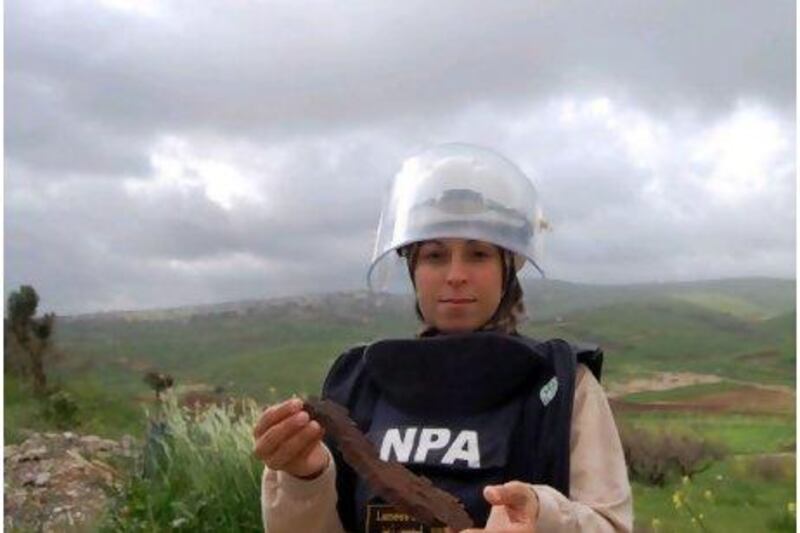BEIRUT // The terrain in south Lebanon that Lamis Zein scours every day should be open fields where farmers can grow food and graze their livestock. Instead, the land is littered with cluster bombs.
Ms Zein and her team search for these unexploded devices, painstakingly combing land in a part of Lebanon where residents are all too familiar with the devastating impact of cluster munitions.
When a bomb is found, Ms Zein, 33, a mother of two young daughters, dons a protective vest and helmet with a visor, walks into the field, sets up her detonator and destroys it.
"Whenever you find a cluster, it reminds you of what happened in 2006. I had five family members die, including my grandmother," Ms Zein said recalling the attack on the village of Bourj al Shamali, close to Tyre, during the 2006 war.
Over the past four decades the cluster bombs left primarily by multiple Israeli military operations in Lebanon have killed hundreds and left many more maimed. Attention was once again focused on the weapons this week, when campaigners and officials from more than 120 countries gathered in Beirut for the second international conference on the Convention on Cluster Munitions, which was signed in 2008.
Since then, 109 countries have joined the treaty. Lebanon and Tunisia, however, are the only two countries in the Middle East to have ratified the convention.
Cluster bombs are made up of submunitions - or smaller bomblets - which, when the main device is exploded, scatter over a wide area, sometimes failing to explode on impact. Campaigners have repeatedly said the bombs pose a major threat to civilian populations.
"My motivation to work this kind of job is loving my country. Seeing the victims, how they are having amputations. I want my kids and other kids to play in a freedom way, without stopping them from playing because of cluster bombs," said Ms Zein, who heads an all-female team which falls under the Norwegian People's Aid mine action programme in south Lebanon.
Ms Zein, from the city of Tyre, is the only woman in Lebanon accredited to search for and detonate cluster munitions. She said her daughters - Razan, 7, and Fatima, 4 - her family and her community are proud of the work she does
"I like my country and I want to help," she said. "Plus, it is a good opportunity for women and to encourage women to work in this field. It shows we can work in anything."
Lebanon is one of the countries most affected by cluster munitions, particularly in the south, where millions of unexploded bomblets remain. During the July 2006 war, israel fired an estimated 4 million cluster submunitions into Lebanon, according to campaigners.
National efforts to remove the bombs are led by the Lebanese army's Lebanon Mine Action Centre. The hope is that through the work of teams such as Ms Zein's, the country will be free of cluster bombs by 2016. However, Lebanese campaigners say US$75 million (Dh275.25m) is still needed to clear all areas.
Since 1975, cluster munitions are believed to have killed more than 700 people in Lebanon and about 4,000 in the Middle East overall. Among those who lost their lives was Raed Mokaled's son, Ahmed, who was killed in 1999.
The incident happened when Mr Mokaled and his family were with friends at a public park near their home in the southern city of Nabatiyeh to celebrate Ahmed's fifth birthday.
"When we arrived, the kids went off to play. Then five minutes later we heard a big explosion," said Mr Mokaled, 46, an optician, in a phone interview. "My wife screamed: 'That is my son.' I found my son bleeding, with lots of injuries on his little body." Ahmed died three hours later in hospital.
"I named it a blind enemy because this weapon can stay for a long time," he said. "It is a very, very, very bad weapon for the future of humanity."
The most recent use of the bombs, according to Steve Goose, the chairman of the Cluster Munition Coalition (CMC), was in Libya by Colonel Muammar Qaddafi's forces in April.
Cluster munitions were also used this year by the Thai army, which launched the bombs into Cambodia.
However, the Thai government recently indicated plans to accede to the Convention on Cluster Munitions, Mr Goose said. The treaty bans the stockpiling, use and transfer of cluster munitions, and also compels states to clear contaminated areas and extend assistance to bomb survivors. "When you destroy a cluster munition, that is a cluster munition that will never take the life or limb of a civilian," Mr Goose said in a press conference earlier this week.
Campaigners at the meeting in Beirut were hoping to convince more countries to sign up to the convention. Thirty-four states represented at the conference, including the UAE, are non-signatories to the treaty.
"This is a very concrete indication of the commitment of the broader international community to get rid of this weapon," said Mr Goose. "There can be no question that this treaty is working. More and more states are joining all the time."
This week, Afghanistan became the 62nd state party to the convention. There are still more than 80 countries that are not part of the treaty, including the US, Israel, China, Russia, India and Pakistan.





